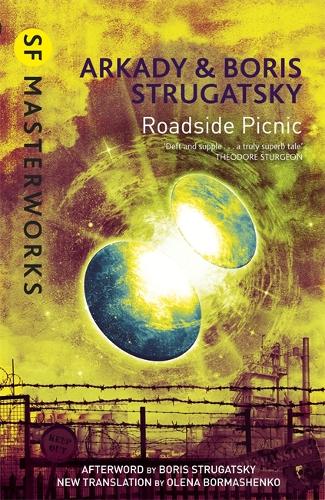
If this were a typical US or British sci-fi novel, we might expect Red and the scientists to set to work solving the puzzle of the artifacts and eventually figure out the motives of the aliens, but this book has a different, more subtle set of concerns. The protagonist is a rough-necked former stalker nicknamed Red, who is working for the scientists at the outset of the book, but hasn't lost his swaggering, cynical view of human nature or his distrust of authority. Then there is a subculture of people called "stalkers", who go into the zone illegally to gather artifacts for sale on the black market.

The population of this town breaks down into roughly two central camps, the first being legitimate scientists studying the artifacts the aliens left behind - though no one is really certain that such mysterious beings actually "left", or even that they were "there" in person in the first place. Roadside Picnic is set in a small town close to a zone in North America (given the bleak tone and character attitudes, the authors undoubtedly had good reason not to use their own country). People who go in run a high chance of being killed (or being unkilled, in the case of corpses that come back to life). The zones are very hazardous places, full of dangerous substances and weird phenomena, many of which defy all current human understanding of physics and even causality. The story begins about a decade after aliens of some sort landed on Earth, bringing several strange "zones" into existence.

It's as gripping as any recent book, and, with a few minor updates, could have easily worked in the present day. Le Guin and a new afterword by Boris Strugatsky explaining the strange history of the novel’s publication in Russia.I was impressed with this short 1970s Russian science fiction novel, which still feels pretty fresh and original.

This authoritative new translation corrects many errors and omissions and has been supplemented with a foreword by Ursula K. And the news he gets from his girlfriend upon his return makes it inevitable that he’ll keep going back to the Zone, again and again, until he finds the answer to all his problems.įirst published in 1972, Roadside Picnic is still widely regarded as one of the greatest science fiction novels, despite the fact that it has been out of print in the United States for almost thirty years. But when he and his friend Kirill go into the Zone together to pick up a “full empty,” something goes wrong. His life is dominated by the place and the thriving black market in the alien products. Red Schuhart is a stalker, one of those young rebels who are compelled, in spite of extreme danger, to venture illegally into the Zone to collect the mysterious artifacts that the alien visitors left scattered around.


 0 kommentar(er)
0 kommentar(er)
